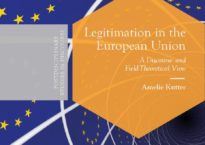Multiple crisis and Discursive Political Studies
Paper presented by Amelie Kutter at the DVPW convention in September 2024. Current diagnoses of crisis often use the term ‘polycrisis’ (Tooze, 2023) to refer to the multiplicity and interdependence of crisis phenomena that seem to characterise contemporary societies. This paper explores the contribution that Discursive Political Studies (DPS, Kutter 2020b) can make to the study of the politics of crisis and, more specifically, polycrisis. Their potential can be exploited by re-considering the different theories of meaning constitution (or: theories of discourse) that they offer. Combined with insights from a review of theories of crisis, they can guide a thorough discourse analysis of crisis.



